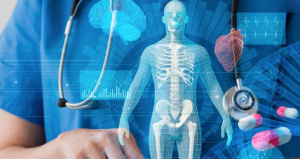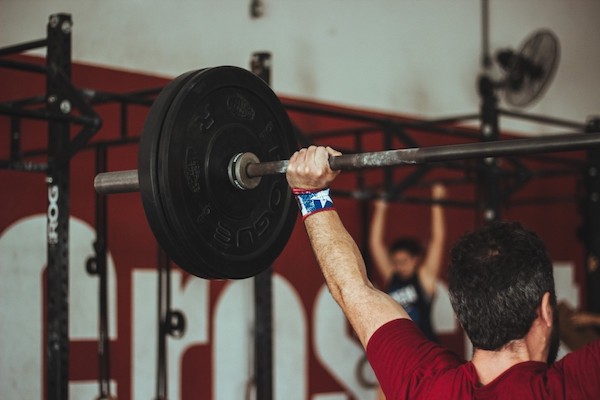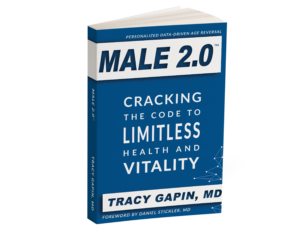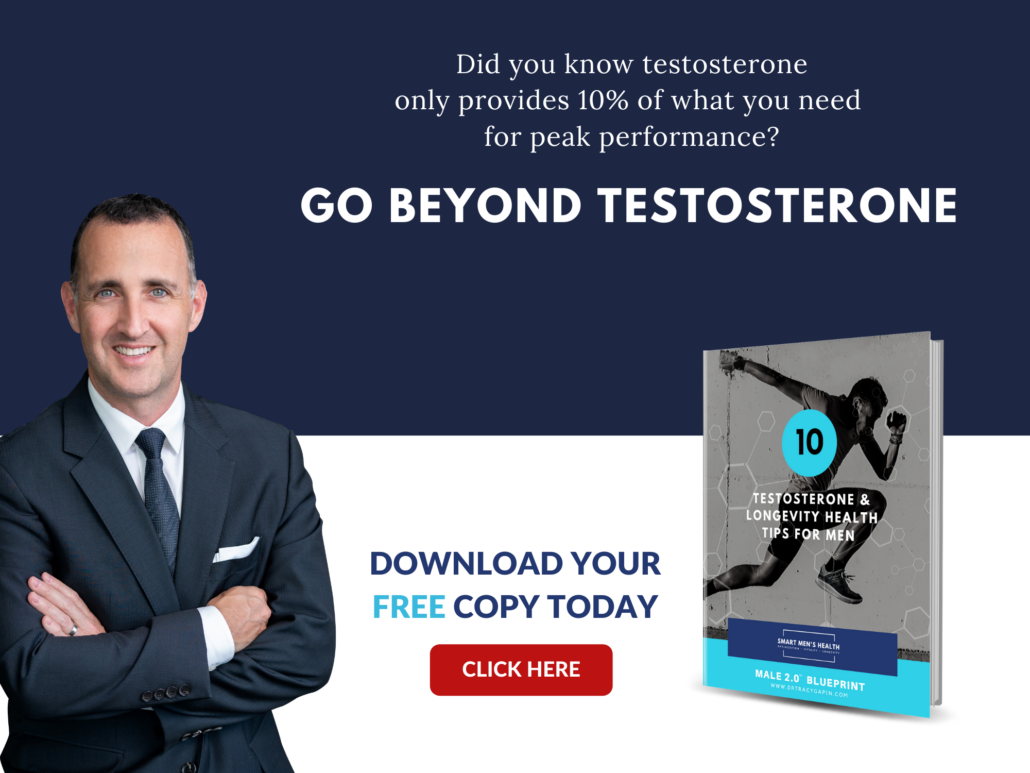
Testosterone levels and body fat are intimately linked. High testosterone equals lower body fat. Low testosterone equals higher body fat.
But why does this relationship exist? Where does it come from?
And how can you overcome it to lose weight and boost testosterone?
The four-way relationship
Testosterone plays a role in everything from body and facial hair to a deeper voice. Testosterone is the hormone that makes you “manly.”
But that’s not all testosterone does. Testosterone is also a critical hormone in controlling weight and building muscle (for both males and females).
There are four ways that testosterone and weight gain are linked. Let’s delve into this intricate relationship below before getting into why they’re linked—and how you can lose weight for healthy T levels this month.
1. Low testosterone causes weight gain.
A common side effect of low testosterone is weight gain. In fact, if you have fast and unusual weight gain, your doctor will likely first test your testosterone levels. Even women who have low testosterone levels will start to gain weight at a faster rate.
Low testosterone especially causes weight gain around the midsection. If you’re getting a gut for the first time in your life, it could be low T!
2. Weight gain lowers testosterone.
Obesity impacts quality of life and shortens life expectancy overall. Weight influences every part of your body, from cardiovascular health to brain health to endocrine health.
Weight gain even affects how your hormones are produced. In fact, gaining weight can almost instantly lower your body’s production of testosterone.
So if you’ve started suffering from low testosterone symptoms, you need to look at the scale. A recent weight gain could be the stimulus of your low T levels.
3. Testosterone therapy boosts weight loss.
Studies show that testosterone therapy can improve body composition and quality of life. Most importantly, research has found that boosting testosterone can have an impact on obesity—with or without other lifestyle modifications.
This means that testosterone plays a critical role in metabolism and belly fat regardless of other typical lifestyle factors.
Boosting your testosterone can assist your weight loss efforts in tandem.
4. Weight loss encourages testosterone production.
When you gain weight, your testosterone lowers. But, if you lose weight, testosterone production increases.
In fact, weight is the first barrier to boosting testosterone levels. You could do everything else right, but if your weight stays the same, your testosterone levels will stay the same. The most effective way to boost your testosterone production is by losing belly fat.
Putting it together
What do these four statements mean?
That weight loss and testosterone are inextricably linked. Low testosterone causes weight gain, and weight gain lowers the production of testosterone. In reverse, boosting testosterone can assist with weight loss, and losing weight can improve T production.
This can either put you in a positive testosterone-weight cycle… or a negative one.
Let’s take a look at where this cyclical relationship comes from—so we can figure out how to get you in a positive T cycle this month!
What causes the testosterone and weight relationship?
The exact reason that testosterone impacts weight is still up in the air. Experts can definitively prove a relationship—but they’re not 100% sure where that relationship comes from.
Still, we have a few pretty good guesses about how the two are linked.
1. Hormone levels
Body fat is directly linked to estrogen. Fat tissue actually contains an enzyme called aromatase, which converts testosterone into estrogen. Moreover, aromatase has been linked to weight gain, aging, and disease.
Estrogen is the antithesis of testosterone. When the body has extra estrogen floating around, it slows the production of testosterone.
So, having more body fat increases aromatase. Aromatase transforms your free-floating testosterone into estrogen. And having more estrogen further slows your testosterone production. When the production of testosterone is slower, it causes you to accumulate even more belly fat.
That’s why it can be so challenging to raise testosterone levels if you’re carrying around extra weight. Even if you supplement with testosterone replacement therapy, your belly fat starts to metabolize all of the extra testosterone and convert it to estrogen. That estrogen encourages your body to hold on to even more fat.
2. Muscle synthesis

Testosterone plays an important role in building muscle. Studies show that testosterone increases the body’s ability to produce protein and muscle mass. Low testosterone can cause a reduction in lean muscle, while high testosterone can help you bulk up quickly.
Having more muscle actually helps you lose weight. Lean muscle actually burns more calories throughout the day than fat does. That’s because your body needs energy to fuel the movement of your muscles—and it gets that energy from your caloric intake. Your belly fat doesn’t move (except when it jiggles), so it doesn’t require any energy or calories.
Testosterone is the key hormone in protein synthesis (aka building muscle). If you have low testosterone, your body isn’t able to build muscle. In fact, research shows men with low T tend to have less muscle mass than men with normal T levels.
So, no matter how much you lift, low testosterone levels can prevent your body from creating the protein it needs to build muscle. In turn, you’re not seeing the fat burning benefits of having lean muscle on the body.
You’ll lose muscle and gain fat!
3. Metabolism
Testosterone actually plays a critical role in metabolism. Metabolism is the process of turning your food into energy and fuel. One study found that men undergoing T therapy had an increased metabolic rate and lower body mass.
How does this work? Testosterone actually interacts with insulin and “eats” extra glucose. It can actually remove the glucose that would otherwise be stored as fat cells in the body. This can help prevent weight gain by getting rid of extra sugar that turns into fat.
So you need high testosterone to keep your metabolism functioning. If you don’t have this, your metabolism slows down. A slow metabolism means that more of your calories are converted to fat rather than energy. This can cause you to gain weight—especially around the midsection.
Boosting your testosterone, though, can help improve your metabolism, which helps you use up more of your food as fuel—rather than as fat.
4. Cortisol

Cortisol is the “stress hormone,” and it actually increases weight gain. That’s because cortisol is released as a response to stress and low blood sugar. Cortisol is released to raise blood sugar in response to some stressor. The sugar in your bloodstream needs to go somewhere… and it ends up in your gut as fatty tissue.
Cortisol also causes gluconeogenesis, which is when your body turns its proteins (muscles) into glucose. Basically, cortisol causes your body to turn muscles into fat.
Testosterone and cortisol have an inverse relationship. Both cortisol and testosterone require pregnenolone for production. If cortisol levels are high, there isn’t enough pregnenolone to produce testosterone—and vice versa.
If your testosterone is low, cortisol can run rampant—which boosts blood sugar and gluconeogenesis. But high testosterone steals away from cortisol production to minimize this stress-related weight gain.
5. Motivation
Common side effects of low testosterone include lethargy, low energy, and poor mood. This can make you less motivated to get up and go to the gym. It may even make you less motivated to throw the ball around with your kids or go to the beach with your buddies.
Low T can you less interested in activities that you once cared about—and likely that’s making you more of a couch potato than an active banana. A stagnant lifestyle can cause you to gain weight, which further lowers your testosterone.
Even worse, the most common side effect of low testosterone is a lowered libido. This makes you less interested in sex—and sex is one of the best ways to burn calories and lose weight. If you’re having sex less frequently, you could actually be cutting out one of your body’s historical methods of burning calories and blasting fat.

6. Age
I’d like to address the topic of age and weight gain for a second.
We all start to pack on the pounds as we get older. We all think that gaining weight is a natural part of aging. And, in some ways, it is. But a lot of this actually comes down to our mindset about weight gain. We think that it’s okay to gain weight as we age because everyone does it.
But it’s not the number on your birthday cake that determines the number on the scale. It comes down to lifestyle. We sit behind our desks without ever moving. We workout less frequently. We stress more. We sleep less.
As we age, we start to fall into habits that encourage weight gain. We assume that it’s because we’re getting older—but it’s really because we’re stuck in the mindset that age equals weight gain.
But you can break this mindset. You have to break this mindset. You need to lose weight in order to boost your testosterone and vice versa.
And you can break it this week, so you can start to take control of your health once again—no matter your age.
How to lose weight for boosted T
There’s a vicious cycle that comes into play here. Low testosterone causes weight gain. And extra belly fat lowers testosterone. This creates a feedback cycle of low T levels and high weight gain that can be hard to break.
Because of this cycle, your typical diet and exercise don’t always work.
So if you’ve been feeling like your weight loss efforts are proving futile… you might be right.
No matter how much you diet or exercise, you could still get stuck in this cycle.
I’m going to give you ways to break through this cycle so you can start seeing results.
The solution is to boost testosterone while losing weight. Because if you boost testosterone but still have belly fat, the fat will metabolize all the extra testosterone. And if you lose some weight but still have low testosterone, the low T levels can cause you to gain that weight right back.
So we need to kill two birds with one stone.
How do you do this? You need to create a plan.

Losing weight and boosting your testosterone needs to be a goal that you set for yourself. You can’t just say, “I’m going to lose weight this year.” Because you could lose a pound and that’s losing weight—but nothing actually changes!
You need to create a specific goal…and then you need a plan for meeting that goal.
- How much weight do you need to lose?
- How much do you need to bump up your testosterone? How will you reach these numbers?
- I recommend working with a doctor to come up with this plan.
I’m a doctor with a proven, customizable plan that’s tailored specifically to you…
Do you want to jumpstart a plan that has proven results?
Do you want to start boosting your testosterone and taking control of your vitality this month?
CONCLUSION
It’s time to get empowered to take control of your health. Unlock the code to peak performance with the Male Method™ to regain your energy, focus and confidence and feel like a man again.
We take a whole-body, epigenetic approach to health, focusing on all inputs and how they affect the human system. With the Male 2.0 Method, we utilize science-based precision medicine, personalizing your health based on your unique genetic blueprint. No more guessing!
We utilize cutting-edge age management protocols to reverse the aging process and expand longevity. And we track and leverage your biometric data using state-of-the-art wearable technology to truly optimize your health.
Ready to take the next steps?
Download the Blueprint
Schedule a Call
**************************
 In Male 2.0™, Dr. Tracy Gapin has turned everything we once thought we knew about men’s health and performance upside down. The old model of how to be “a man” is broken. A man who works himself to death. Unfortunately, a man who tries to NOT get sick but isn’t really healthy either. And a man who takes a pill for every ill but is never really cured. That was Male 1.0. Now, imagine being THE MAN ─ owning your performance in the bedroom, the weight room, and the boardroom. Living a fully optimized life. Becoming limitless. This is Male 2.0! Available on Amazon.
In Male 2.0™, Dr. Tracy Gapin has turned everything we once thought we knew about men’s health and performance upside down. The old model of how to be “a man” is broken. A man who works himself to death. Unfortunately, a man who tries to NOT get sick but isn’t really healthy either. And a man who takes a pill for every ill but is never really cured. That was Male 1.0. Now, imagine being THE MAN ─ owning your performance in the bedroom, the weight room, and the boardroom. Living a fully optimized life. Becoming limitless. This is Male 2.0! Available on Amazon.
Tracy Gapin, MD, FACS is a board-certified Urologist, world renowned Men’s Health & Performance Expert, Author, and Professional Speaker. Using state-of-the-art biometric monitoring, nutrition and lifestyle intervention, Dr. Gapin coaches Fortune 500 executives and evolutionary leaders of business, sports medicine, and high performance. He specializes in cutting-edge precision medicine with an emphasis on epigenetics, providing men with a personalized path to optimizing health & performance. www.GapinInstitute.com
Want more tips to optimize your health?
Listen to the latest podcasts. Click HERE






 legumes, beans, and some dairy. Often, when we think of a high-protein diet, we think of eggs, nuts, and lots of meat like chicken and beef.
legumes, beans, and some dairy. Often, when we think of a high-protein diet, we think of eggs, nuts, and lots of meat like chicken and beef. 

 restoring muscle glycogen storage for the fastest recovery process.
restoring muscle glycogen storage for the fastest recovery process.